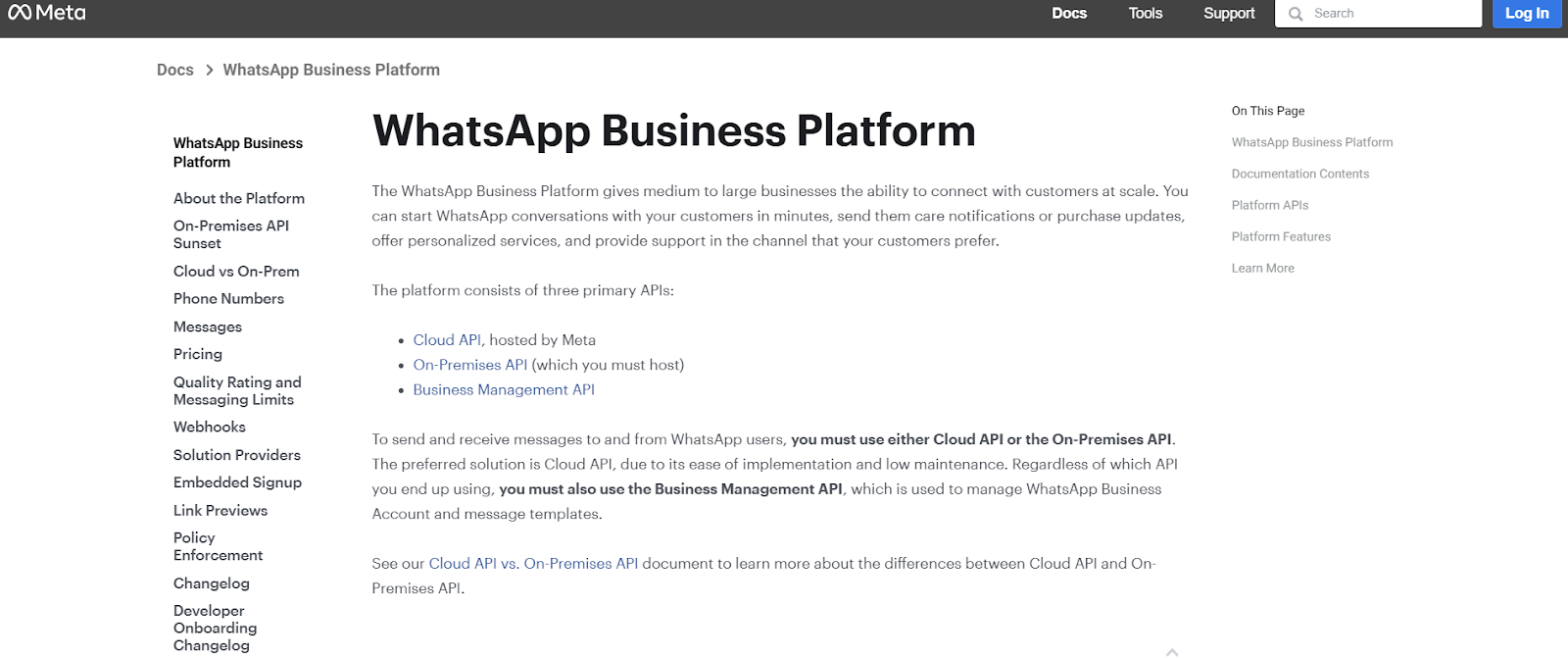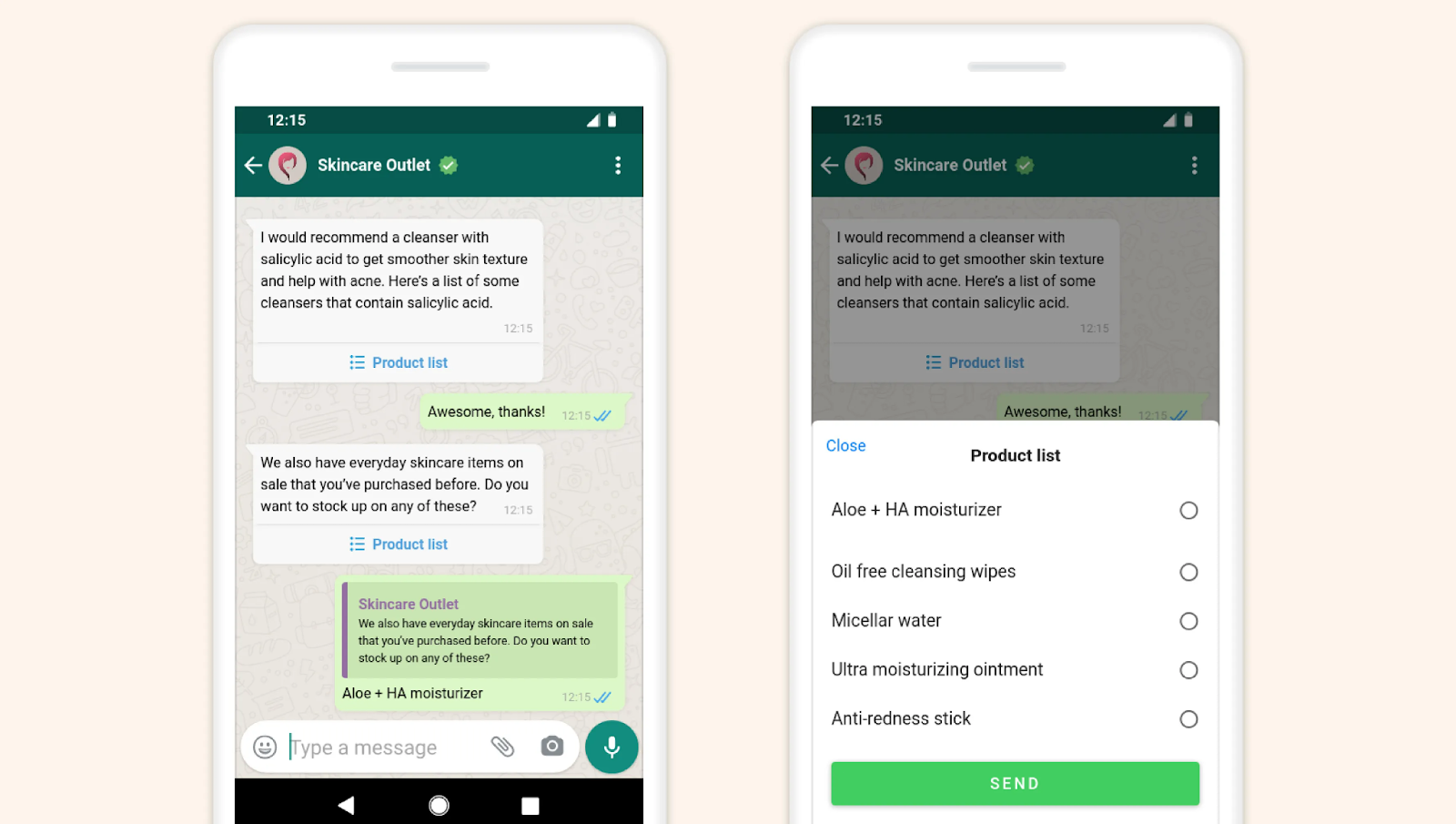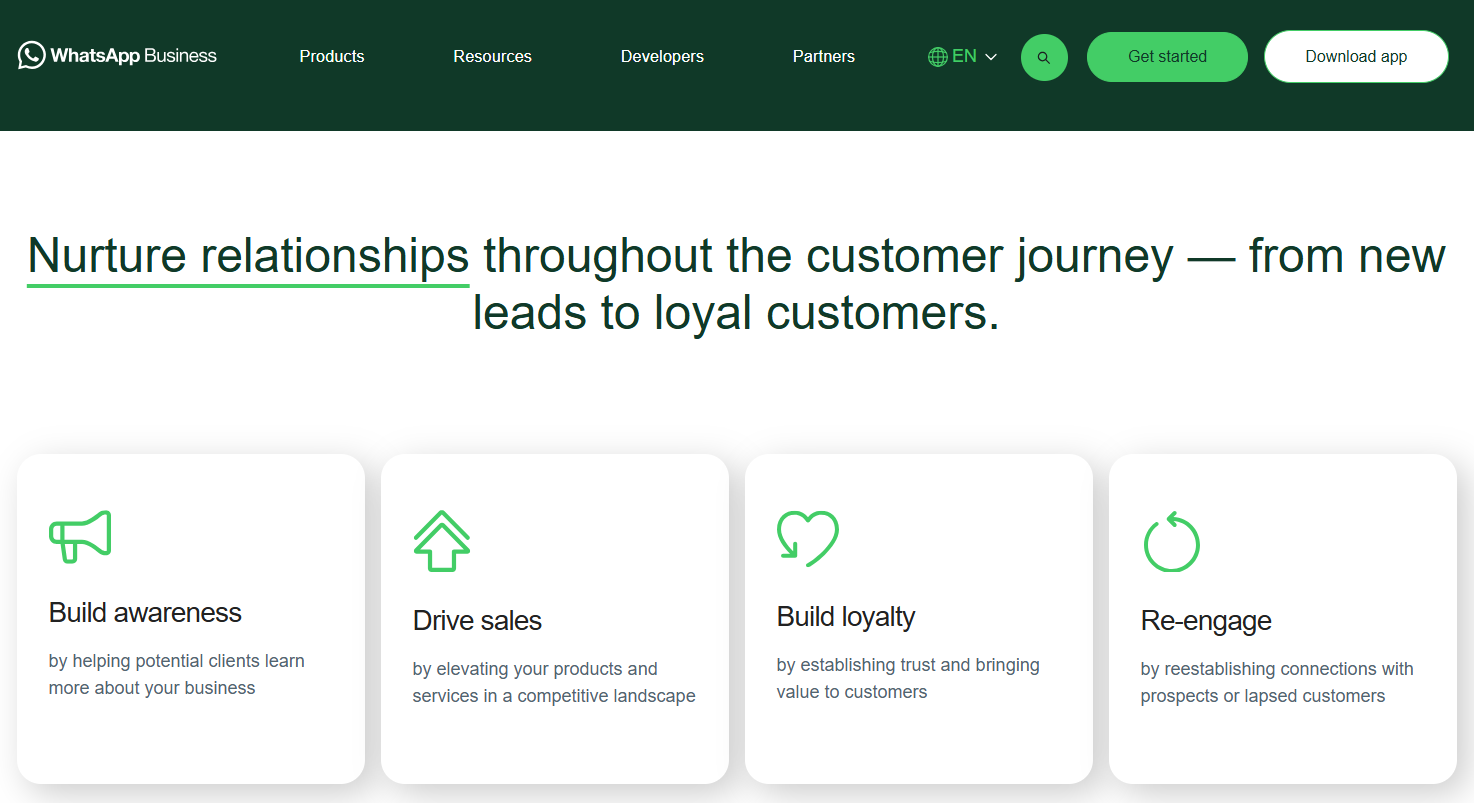WhatsApp API is transforming the world of conversational commerce, allowing businesses to connect with customers in real-time. In fact, conversational commerce is growing rapidly, with WhatsApp leading the way. With over 2 billion users globally, WhatsApp is not just a messaging platform anymore; it’s a powerful tool for businesses to engage customers and close sales directly through chat.
In 2024, 85% of consumers expressed a preference for timely, proactive communication from brands. This makes WhatsApp API a game changer, as it enables businesses to provide immediate responses, personalized product recommendations, and even transactional updates.
With the right strategy, WhatsApp API can enhance customer satisfaction and increase revenue. Let us explore how WhatsApp API is revolutionizing conversational commerce and how you can use it to boost customer loyalty and maximize sales.
What is Conversational Commerce?
Conversational commerce is the practice of using chat, messaging apps, or voice assistants to communicate with customers during the buying process. Instead of handling complex websites or lengthy forms, customers can chat directly with businesses to ask questions, get product recommendations, and complete purchases, all within a conversation. This approach makes the shopping experience faster, more personal, and highly convenient.
Customers prefer conversational commerce because it feels more like a real conversation. They can ask questions in real time and receive instant answers, making the process smoother. Conversational commerce bridges the gap between traditional e-commerce and real-time customer support, improving overall customer satisfaction. WhatsApp Messaging API plays a key role in making this possible, by allowing businesses to offer seamless interactions within the app customers already use daily.
Comparison of WhatsApp API and WhatsApp Business App
Choosing between the WhatsApp Business App and the WhatsApp Business API depends on a business’s size, customer engagement needs, and level of automation required. While both versions allow businesses to interact with customers on WhatsApp, they serve different purposes and audiences.

This comparison will outline the key features of both, highlighting which version suits specific business needs.
| Feature | WhatsApp Business App | WhatsApp API |
| Audience Size | Suitable for small businesses | Designed for medium to large-scale businesses |
| Automation Level | Limited to auto-replies and basic automation | Full automation and advanced chatbot integration |
| Customer Engagement | One-on-one manual interaction | Automated customer engagement with chatbots and human agents |
| Analytics and Reporting | Basic message statistics | Detailed analytics with open rates, response times, and conversions |
| Integration | Limited integrations | Integrates with CRM, payment systems, and other business platforms |
| Pricing | Free for most features | Paid service with scalable solutions |
How WhatsApp API Powers Conversational Commerce
In conversational commerce, speed and personalization are key. The API for WhatsApp provides businesses with the tools to engage customers instantly, automate routine inquiries, and offer personalized experiences that resonate with individual preferences. Below are some of the strong benefits that Whatsapp API gives you:
Real-Time Engagement
One of the biggest benefits of WhatsApp API is real-time engagement. Customers no longer have to wait hours or even days to get a response. With WhatsApp API, businesses can respond instantly to customer queries, improving satisfaction and increasing the chances of conversion. For example, if a customer is interested in a product but has questions about its features, they can simply send a message and get an immediate response, helping them make faster decisions.
Real-time engagement helps reduce the frustration that customers often feel when they’re left waiting for support or information. The faster a business can engage with a customer, the more likely they are to close the sale. WhatsApp API enables businesses to meet this demand for instant communication, ensuring that customers stay engaged throughout the buying process.
Automation and Chatbots
Automation is a key feature of WhatsApp API that enhances conversational commerce. With chatbots, businesses can automate responses to frequently asked questions, such as store hours, return policies, or product availability. This allows businesses to handle a large volume of inquiries without overwhelming their support teams. WhatsApp chatbots can also provide personalized product recommendations based on the customer’s preferences, making the shopping experience more tailored.

Metrics show that businesses using WhatsApp chatbots can increase their lead generation by over 500% with the efficiency and speed of automated responses. These bots work around the clock, providing instant support even outside of regular business hours. Automation doesn’t just improve customer support; it also increases the chances of converting casual inquiries into actual sales by keeping customers engaged.
Personalized Customer Journeys
One of the greatest strengths of WhatsApp API in conversational commerce is its ability to deliver highly personalized experiences. Using customer data, businesses can tailor each interaction to meet the specific needs of the customer. For example, if a customer frequently purchases a particular type of product, businesses can send personalized offers, product recommendations, or reminders directly through WhatsApp.
Personalization has been shown to significantly impact customer retention and satisfaction. According to studies, 31% of users expect personalized offers and messages from brands on WhatsApp. By using customer data to tailor interactions, businesses can build stronger relationships with their customers, leading to repeat purchases and higher customer lifetime value.
Important Metrics to Track in WhatsApp API Conversational Commerce
To optimize your WhatsApp API strategy for conversational commerce, tracking specific metrics is essential. These metrics help businesses measure the effectiveness of their messaging and improve customer engagement. Below is a list of the most important metrics and why they matter, along with real-world examples:
Open Rates
- Open rate refers to the percentage of messages opened by customers. It’s a key indicator of how relevant and engaging your messages are.
- High open rates suggest that your customers find your messages appealing and valuable. If your open rates are low, it may indicate that your messaging isn’t resonating with your audience or the timing is off.
- Example: A retail company sends out product promotions via WhatsApp API. By tracking the open rate, they discover that messages sent in the morning have a 60% open rate, while messages sent in the afternoon have only 40%. Adjusting the timing can boost overall engagement.
Response Time
- This metric tracks how long it takes for a customer to respond to your message.
- The quicker the response time, the more engaged the customer is. Fast responses lead to faster sales, while slow response times can result in customer frustration and lost opportunities.
- Example: A fashion boutique uses WhatsApp API for customer inquiries. After sending promotional offers, customers who respond within five minutes have a 25% higher conversion rate than those who take more than an hour to respond. This indicates the need for prompt follow-ups.
Conversion Rate
- The percentage of customers who purchase interacting with your WhatsApp messages.
- Conversion rate helps track how successful your sales efforts are through WhatsApp. Higher conversion rates indicate that your messaging effectively drives customers to complete their purchases.
- Example: An e-commerce store tracks its WhatsApp conversions and finds that sending personalized product recommendations increases conversions by 15%. This shows that tailored messaging leads to higher sales.

Abandonment Rate
- This is the percentage of carts abandoned after a customer interacts with your business.
- A lower abandonment rate means that follow-up messages, such as cart reminders or special offers, are effective in bringing customers back to complete their purchases.
- Example: A cosmetics brand tracks its abandonment rate and notices a 25% drop in abandoned carts after sending a follow-up message offering free shipping. This highlights the impact of timely intervention.
Repeat Customer Rate
- The percentage of customers who make multiple purchases after interacting with your business through WhatsApp.
- A high repeat customer rate indicates strong customer loyalty and successful follow-up communication. It’s an important metric for long-term business growth.
- Example: A food delivery service uses WhatsApp API to send personalized discount codes to returning customers. By tracking repeat customer rates, they find that 35% of customers make another purchase within a month, demonstrating the effectiveness of loyalty messaging.
Types of WhatsApp API Messages for Different Stages of the Customer Journey
To enhance the customer journey, each stage of interaction on WhatsApp requires specific message types that meet the customer’s needs and encourage engagement:
- Awareness: Begin with a welcome message or product introduction to introduce new customers to your brand. These messages provide essential information and create a positive first impression, setting the stage for a valuable customer relationship.
- Consideration: Send personalized product recommendations based on customer preferences or browsing history. This approach makes customers feel understood and increases the likelihood of further engagement by presenting relevant options.
- Decision: Use discount offers and cart reminders to encourage customers to complete their purchases. Timely reminders, such as limited-time discounts, nudge hesitant customers to finalize their transactions.
- Post-Purchase: Keep customers informed with order confirmations and delivery updates. These messages reassure customers that their purchase is on track, improving trust and satisfaction.
- Retention: To build long-term loyalty, send feedback requests and loyalty offers. These messages show customers that you value their input and encourage repeat purchases, ultimately fostering a lasting relationship.
Key Benefits of WhatsApp API for Conversational Commerce
Businesses can scale their operations through automation while maintaining a human touch where needed, resulting in stronger customer relationships, higher conversion rates, and reduced cart abandonment.
Below are the key benefits of WhatsApp API that can help businesses stay ahead in today’s competitive market and provide customers with the experience they expect.
Boosts Customer Engagement
WhatsApp API allows businesses to engage customers at every stage of the buying journey. Whether it’s answering product questions or providing updates on delivery, businesses can maintain constant communication, which enhances engagement. Higher engagement leads to stronger customer relationships and a greater likelihood of repeat business.
Increases Sales Conversion
The streamlined communication that WhatsApp API offers makes it easier for customers to make purchases. Businesses can guide customers through the buying process in real time, addressing any concerns and helping them complete transactions. WhatsApp has been shown to drive 45% conversion rates when used effectively in sales.
Reduces Cart Abandonment
One of the key challenges in e-commerce is cart abandonment. With WhatsApp API, businesses can send automated reminders or offer assistance when customers leave items in their cart. These personalized follow-ups are effective in bringing customers back and completing their purchase, thus reducing abandonment rates.
Improves Customer Support
The API provides a platform for efficient and personalized customer support. By integrating automated responses and live agent support, businesses can handle customer inquiries more quickly and effectively. Customers receive immediate answers to their questions, improving satisfaction and increasing trust in the brand.
Best Practices for Using WhatsApp API in Conversational Commerce
To maximize the potential of Whatsapp API, businesses must adopt a strategic approach. Many businesses struggle to provide real-time communication while balancing the need for efficiency. Relying too heavily on automation can feel impersonal, while solely using human interaction can slow down response times, leading to customer frustration and lost sales.
So, it is essential to follow some best practices in order to get maximum benefits. Below are few of them:
Personalization is Key
Use customer data to personalize each interaction. Tailor messages based on customer behavior, previous purchases, and preferences. Personalized experiences create stronger customer relationships and drive higher sales.
Balance Automation and Human Interaction
While automation is helpful for answering common queries or providing updates, don’t rely solely on bots. Make sure human agents are available to handle complex queries or high-value customers, ensuring a smooth and satisfying customer experience.
Track Metrics and Optimize
Analyze customer engagement data regularly. Track metrics such as open rates, response times, and conversion rates to continuously optimize your WhatsApp marketing strategy. These insights will help you improve interactions and increase customer satisfaction.
Conclusion
WhatsApp API is revolutionizing conversational commerce by enabling real-time, personalized interactions that drive sales and customer satisfaction. By implementing these strategies and leveraging WhatsApp API, businesses can enhance their conversational commerce efforts and build stronger relationships with their customers.